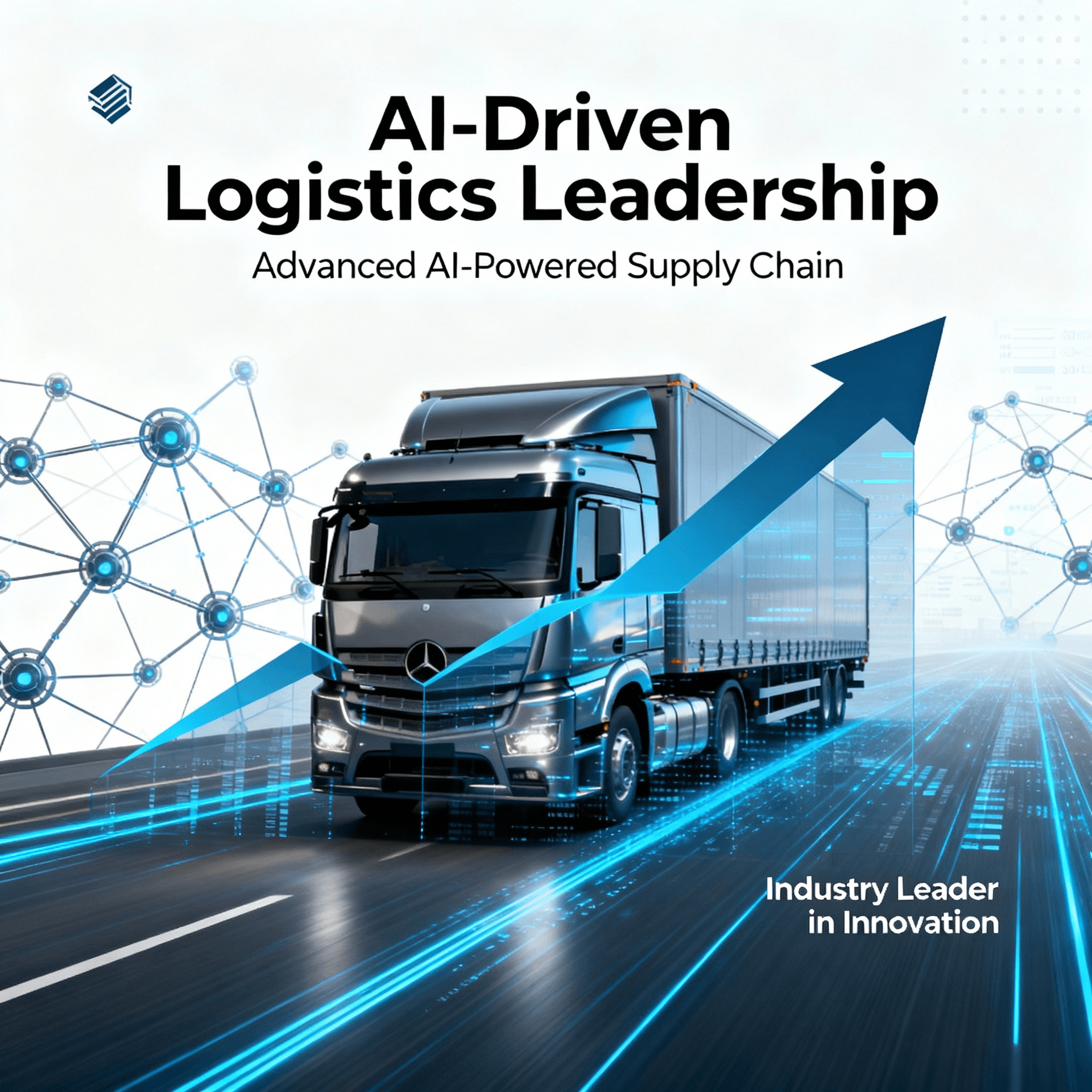How Does AI Give Logistics Companies a Competitive Advantage?
Saturday, 4 Oct 2025
|
In the ever-evolving logistics industry, where speed, efficiency, and cost reduction are crucial, businesses need to stay ahead of the competition. While traditional methods have their place, leveraging Artificial Intelligence (AI) is quickly becoming the game-changer that companies cannot afford to ignore. For CEOs, CXOs, and COOs looking to gain a competitive edge, AI offers groundbreaking opportunities for transforming operations.
Let’s explore how AI is empowering logistics companies to gain that all-important competitive advantage and how your business can benefit from this technological revolution.
1. Optimizing Supply Chain Efficiency with AI
One of the greatest challenges logistics companies face is ensuring a smooth, efficient supply chain. AI provides tools to optimize inventory management, demand forecasting, and route planning, all in real-time, significantly improving operational efficiency.
AI for Inventory Management:
AI-powered tools allow logistics companies to forecast demand and optimize stock levels across multiple warehouses. This means fewer stockouts and less overstocking, resulting in a more efficient, cost-effective supply chain.
Real-Time Route Optimization:
AI can analyze vast amounts of data to determine the most efficient routes for drivers, factoring in variables like traffic, weather, and fuel costs. This reduces delivery times, fuel consumption, and transportation costs, providing a clear edge over competitors who rely on traditional methods.
Real-World Example: Companies like FedEx and UPS use AI-powered route optimization systems to ensure timely deliveries while reducing costs and carbon emissions. This has helped them remain leaders in the logistics space.
2. Enhancing Customer Experience through AI
Customer experience is a key differentiator in the logistics industry. Today’s consumers expect fast, reliable, and transparent services. AI offers powerful solutions to meet these expectations.
Personalized Customer Service:
AI can enable chatbots and virtual assistants to handle customer queries 24/7, providing quick responses to frequently asked questions and assisting in tracking shipments. By automating these interactions, logistics companies can offer a consistent, personalized experience without human intervention, improving customer satisfaction and loyalty.
Proactive Communication:
AI can monitor shipments in real-time and predict delays, proactively notifying customers and providing alternative solutions. This transparency not only boosts customer trust but also reduces the number of customer complaints and calls.
Real-World Example: DHL uses AI to provide real-time tracking and proactive notifications to its customers, enhancing their experience and setting them apart from other logistics providers.
3. AI-Driven Predictive Analytics for Smarter Decision-Making
Data is at the core of the logistics industry, and AI is revolutionizing how companies leverage it. By analyzing large volumes of data, AI can offer predictive insights that help logistics businesses make smarter, data-driven decisions.
Predicting Demand and Optimizing Resources:
AI algorithms analyze historical and real-time data to predict demand fluctuations, helping logistics companies adjust their resources accordingly. Whether it's adjusting the workforce during peak seasons or optimizing warehouse capacity, AI helps maintain smooth operations even in unpredictable conditions.
AI for Risk Management:
AI can predict potential disruptions in the supply chain, such as natural disasters, labor strikes, or traffic congestion. This enables logistics companies to take proactive measures to mitigate risks and avoid costly disruptions.
Real-World Example: Maersk, the global shipping giant, uses AI to predict shipping demand and optimize its fleet utilization. This level of predictive analytics allows them to stay ahead of competitors by responding quickly to changes in the market.
4. Cost Reduction through Automation and Efficiency
Logistics companies are under constant pressure to reduce operational costs without compromising on service quality. AI helps achieve significant cost savings by automating various aspects of the logistics process.
Automating Repetitive Tasks:
AI automates routine and repetitive tasks such as data entry, invoice processing, and document management, reducing the need for manual labor and human intervention. This not only speeds up operations but also cuts down on errors, improving the overall efficiency of logistics operations.
AI in Fleet Management:
AI systems can optimize fleet maintenance schedules, predict when vehicles will need repairs, and help fleet managers keep track of fuel consumption and driver behavior. By reducing downtime and improving fleet utilization, logistics companies can lower their operating costs significantly.
Real-World Example: Amazon has implemented AI-driven automation in its warehouses, including robots that handle sorting, packaging, and shipping. This automation has enabled Amazon to significantly cut down on labor costs while improving delivery speeds.
5. AI for Sustainability: Going Green in Logistics
Sustainability is becoming a key priority for businesses across industries, and logistics companies are no exception. AI can help logistics companies reduce their environmental impact while simultaneously gaining a competitive edge.
Optimizing Fuel Consumption:
AI-powered route optimization and predictive maintenance can drastically reduce fuel consumption and carbon emissions. By ensuring that trucks take the most efficient routes and are always in optimal condition, logistics companies can significantly reduce their carbon footprint.
Smart Warehouse Design:
AI is also being used to optimize warehouse layouts and energy usage, further reducing the environmental impact. From smart lighting systems to temperature regulation, AI helps create more energy-efficient warehouses that align with sustainability goals.
Real-World Example: UPS has made strides in reducing its environmental footprint by implementing AI-powered fleet management and route optimization systems that help reduce fuel consumption and emissions.
6. Gaining Insights with AI-Driven Analytics and Reporting
AI offers powerful analytics tools that provide deep insights into logistics operations. By unlocking these insights, companies can make informed decisions that improve their performance and bottom line.
Real-Time Analytics:
AI dashboards provide real-time reporting on key performance metrics like delivery times, inventory levels, and customer satisfaction. With this data at their fingertips, logistics executives can quickly identify bottlenecks, optimize operations, and track the performance of various teams.
Actionable Insights:
By continuously analyzing operational data, AI can uncover inefficiencies that may otherwise go unnoticed. These insights enable logistics companies to implement targeted improvements that reduce costs and increase profitability.
Real-World Example: Maersk uses AI analytics to track container shipments and predict delivery times, providing real-time insights into its global operations and enhancing customer satisfaction.
Conclusion: Staying Ahead with AI
The logistics industry is more competitive than ever, and AI offers a significant advantage for companies looking to outperform their competitors. By optimizing operations, enhancing customer experience, reducing costs, and promoting sustainability, AI is not just a tool for improving logistics—it’s a competitive weapon.
As the industry continues to evolve, those who adopt AI-driven solutions will be better positioned to stay ahead of the curve. For CEOs, CXOs, and COOs, the question is no longer whether to invest in AI—it’s how quickly can you integrate AI into your logistics operations to unlock a competitive advantage?
Ready to Gain Your Competitive Edge with AI?
If you’re ready to see how AI can transform your logistics business, book a demo with Debales AI. Let us show you how AI can streamline your operations, reduce costs, and boost customer satisfaction.
Also, take a deeper dive into AI’s impact on logistics with our blogs on How Predictive Analytics Works for Logistics: Driving Smarter Supply Chains and What Exactly is AI in Logistics and Supply Chain Management?.


